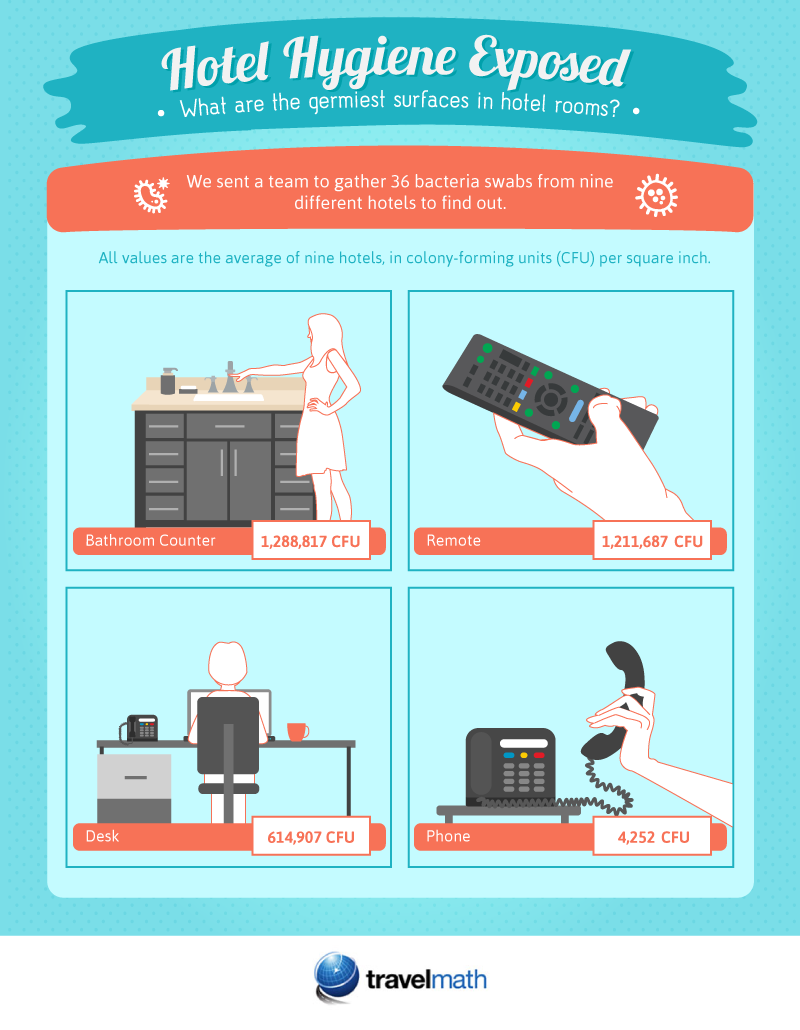Whether you stay at a fancy five-star hotel or a basic three-star, one thing is certain: you’re going to be exposed to germs.

What you may be surprised to learn, though, is three-star hotels appear to be less germ-ridden than their pricier alternatives. That’s the finding from a new study called “Hotel Hygiene Exposed.”
The team behind the Travelmath study went to nine hotels and swabbed the most frequently touched surfaces:
- bathroom counter
- remote control
- desk
- phone
Here’s how they compared, on average:
The bacteria colonies that grew from those surfaces were then compared.
“In our four-star hotels, the bathroom counter was the most bacteria-laden surface (in fact, it was the single dirtiest surface among all spaces),” the study says.
The bathroom counter — where many guests put their toothbrushes — was also deemed dirtiest in three-star hotel rooms.
It still had eight times less bacteria growth than a four-star bathroom counter, and three times fewer than a five-star one.

Get breaking National news
READ MORE: Public bathroom hand dryers ‘splatter’ germs everywhere
Bacillus spp, which the study says could be associated with various infections, including respiratory and gastrointestinal problems, was found on the remote control of three-star hotels. Yeast was also found in the bathroom.
That same bacteria was also found on the remote and phone of four-star hotels.
In five-star hotels, the brunt of bacteria were gram negative (which the study says cause respiratory and other infections). The phone was reportedly rife with gram-positive cocci (which apparently can cause various ailments like skin infections and pneumonia).
“Overall, according to the surfaces we tested, the average hotel room appears to be dirtier than a typical home, an airplane, and even a school,” the study says.
So should hotel guests be worried?
Jason Tetro, microbiologist and author of The Germ Files, takes the findings with a grain of salt.
He believes most of the bacteria the study mentions are actually harmless — even the gram negative bacteria that he says may be associated with feces.
“Unless you’re licking the edge of the toilet, you’re probably not going to get sick.”
He adds that gram positive bacteria is typically harmless as well, unless it contains antibiotic-resistant bacteria such as MRSA. But the study doesn’t mention that, and Health Canada has said that most MRSA infections and outbreaks occur in people in hospitals or other health care facilities.
As for Bacillus spp, he says that’s most likely just dirt. And it’s everywhere. Even in the air we breathe.
“It’s over hyped,” he says of the study.
READ MORE: Fact file: What are C. difficile, MRSA and CRE?
Still, it’s not the first time hotels have been exposed for being less than clean.
A 2014 hidden camera investigation by NBC’s Today revealed some questionable cleaning practices — including maids drying drinking glasses with dirty towels from the ground, or cleaning the counter with the same towel used to dry the toilet.
WATCH: How fast can germs spread? You’d be surprised.
“The good news: You can disinfect most of these surfaces fairly easily with antibacterial wipes or spray,” the study points out.
“And rather than disinfecting the remote control, one solution is to seal it in a clear plastic sandwich bag before using it.”
Don’t forget to wash your hands.
The full comparison can be found below:




Comments
Want to discuss? Please read our Commenting Policy first.